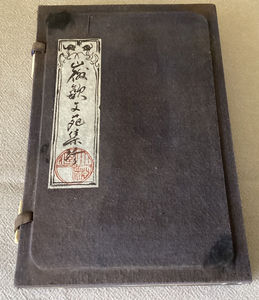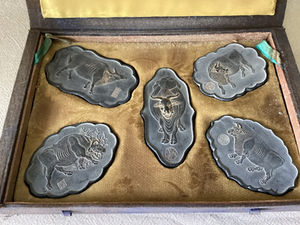Create Your First Project
Start adding your projects to your portfolio. Click on "Manage Projects" to get started
Chinese Antique 5 Oxen 五牛圖 Ink Stick / Cake Set
CHINESE ANTIQUE 5 OXEN INK STICK / CAKE SET
砚Scholars Studio
文房四寶: 筆、墨、紙、硯
OVER 100 YEARS OLD
RARE COLLECTORS TREASURE FOR THE SCHOLARS STUDIO
QING DYNASTY (1644-1911)
An excellent collection of ink stick /cake portraying 5 Oxen (五牛圖), the central oxen bearing on the side the characters Qianlong Niang Zhi. (made in the Qianlong Period).
Condition : Ink Stick /cakes, no breaks , very good for age. Gilding age faded. Original Box : Age Faded & Stained.
Refer the large images for details & condition.
Please Note... depending on your computer monitor / phone / ipad etc. colour may vary to actual.
Outer Box
Length about 25.5 cm
Width about 17 cm
Depth about 3 cm
Ink Sticks are various lengths and widths :
Longest about 10.3cm.
Widest about 5.5cm
A$450
Five Oxen (五牛圖)
The ink stick /cake are carved exactly the same as on the painting by Han Huang (韓滉). A prime minister in the Tang Dynasty (618–907).
It was painted 1,250 years ago on hemp paper (麻紙).
It has been widely recognised as the earliest extant paper painting in China, and is known today as one of the top 10 masterpieces in the country’s art history.
In Chinese culture, ‘five’ is widely used in auspicious sayings. Han Huang had at least five elder and three younger brothers, including Han Hao (韓浩), Han Qia (韓洽), Han Hong (韓洪), Han Huan (韓澣), Han Hong (韓汯),Han Hun (韓渾) and Han Hui (韓洄). They were also government officials. A few of them were killed in wars. Some art historians think that the five oxen represent Han and his brothers.
Han Huang (韓滉) (723 –787), courtesy name Taichong (太沖), was an important official of the Tang Dynasty. He served in four generations of Emperors, Emperor Xuanzong (玄宗)(712-756), Emperor Suzong (肅宗)(756-762), Daizong (代宗) (762-779) and Dezong (德宗)(779-805). Han Huang’s father Han Xiu (韓休) was also an important official and briefly served as chancellor in Xuanzong’s reign. Despite the family being rich, Han Huang lived a very simple and frugal life. During his long career in the government, Han served in a number of offices, such as imperial censor, defence, rites, civil service affairs, executive bureau of government as well as the prefect and governor in various parts of the country. He was loyal to the Emperors, worked extremely hard and stamped out corruption in his administration.



















